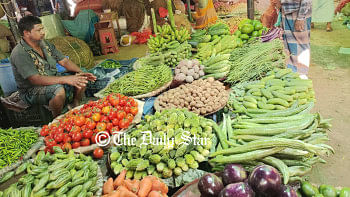Homestead gardening makes shoal people self-reliant
Expanded cultivation of vegetables on homesteads has changed lives of the people of char areas as thousands of extremely poor and landless families living in the Brahmaputra basin have been profiting from it in recent years.
More than 1.27 lakh extremely poor char families of ten north-western districts so far have become self-reliant through vegetable cultivation. They have been selling extra produce since 2004.
With assistance from Char Livelihoods Programme (CLP), families living in the char area have been involved in income-generating activities including homestead gardening.
Khondker Mesbahul Islam, horticulture specialist of the Department of Agriculture Extension, said these families have been cultivating, among other vegetables, pumpkin, sweet gourd, cucumber, cauliflower and garlic.
According to CLP sources, 55,000 of the poorest households have benefited under the first phase of the programme between 2004 and 2010, and 72,000 out of 78,000 households are under its second phase which will run till 2016.
DFID and the Australian Agency for International Development have been supporting the implementation of the programme.
The LGRD ministry has been sponsoring the CLP, which is managed by Maxwell Stamp Plc.
Mamunur Rashid, agriculture and environment coordinator, RDRS Bangladesh and Nazrul Islam, agriculture officer of Chilmari upazila, said the CLP has been working successfully with the extremely poor char households to improve their livelihood.
Over 1.27 lakh extremely poor char households of Kurigram, Bogra, Lalmonirhat, Pabna, Gaibandha, Sirajganj, Jamalpur, Nilphamari, Rangpur and Tangail have overcome abject poverty through vegetable farming, animal husbandry and other income generating activities.
Talking to the news agency, some beneficiaries of CLP narrated their achievements through vegetable farming on their tiny homesteads.
Before taking up vegetable farming, most of the families were poverty-stricken in the sandy char areas of the Brahmaputra, Jamuna, Teesta and Dharla basins, they said.
Monjusree Saha, head programme coordinator of RDRS Bangladesh, one of the organisations implementing CLP, said the char people have now adapted to the harsh conditions and are leading better lives.
Their children are able to go to schools, Saha added.

 For all latest news, follow The Daily Star's Google News channel.
For all latest news, follow The Daily Star's Google News channel. 



Comments